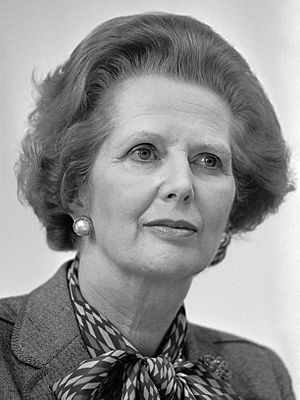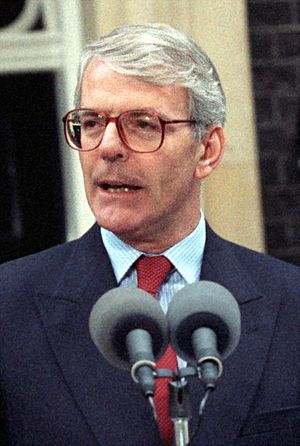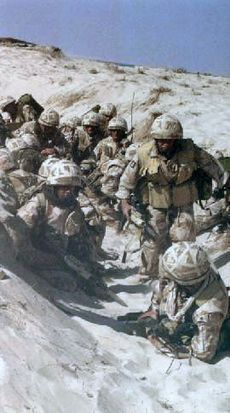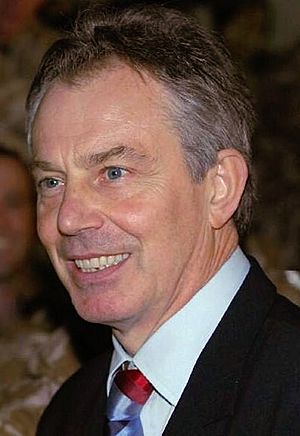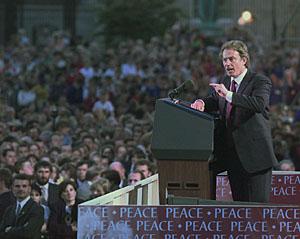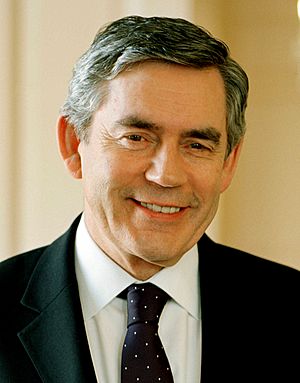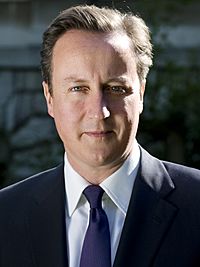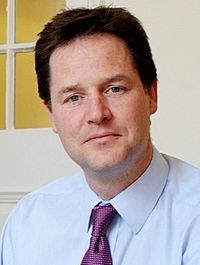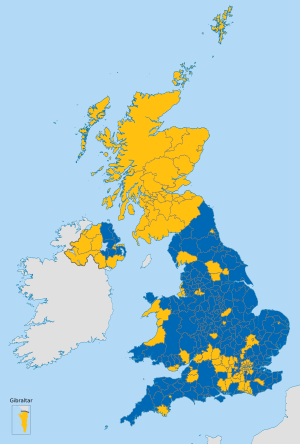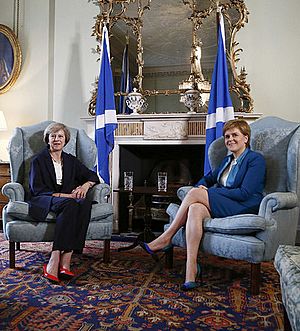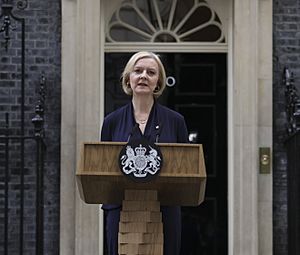Political history of the United Kingdom (1979–present) facts for kids
| 3 May 1979 – present | |
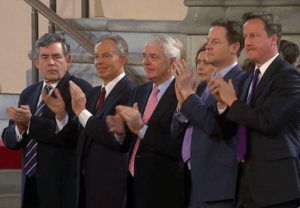
Former prime ministers Gordon Brown (2007–2010), Tony Blair (1997–2007), John Major (1990–1997), Deputy Prime Minister Nick Clegg and then-Prime Minister David Cameron pictured together in 2011
|
|
| Preceded by | Postwar era |
|---|---|
| Monarch | |
| Leader(s) | |
The modern political history of the United Kingdom from 1979 to today began when Margaret Thatcher became Prime Minister in 1979. This started 18 years of Conservative government. A victory in the Falklands War (1982) and strong actions against trade unions helped the Conservatives win three more elections. Thatcher's government sold off many state-owned companies like British Telecom and British Airways. She kept the National Health Service. A new local government tax, called the "poll tax", was very unpopular. This led the Conservatives to remove Thatcher as Prime Minister in 1990.
Thatcher's replacement, John Major, changed the "poll tax" to Council Tax. He also managed Britain's part in the Gulf War. Even with an economic slowdown, Major led the Conservatives to a surprise win in 1992. But events like "Black Wednesday" in 1992, disagreements over the European Union, and various problems involving Conservative politicians led to a huge win for the Labour Party in 1997. Labour, led by Tony Blair, had moved its policies closer to the middle, calling itself 'New Labour'. The Bank of England was given control over money policy. Scotland and Wales gained their own parliaments, and London got a new local government with a Mayor. The Good Friday Agreement was signed in 1997 to help end The Troubles in Northern Ireland. This agreement created a power-sharing Northern Ireland Assembly in 1998.
Blair led Britain into wars in Afghanistan and Iraq. He left office in 2007 and was replaced by his finance minister, Gordon Brown. A global economic crisis from 2008 to 2010 led to Labour losing the 2010 election. A new government was formed by the Conservative and Liberal Democrat parties, led by David Cameron. This government cut public spending to reduce the country's debt. In 2016, the UK voted in a public vote to leave the European Union. This led to Cameron stepping down. His Home Secretary, Theresa May, took over.
May tried to lead the country out of the European Union with her Brexit withdrawal agreement. When Parliament rejected her deal three times, May resigned. The next Conservative leader was Boris Johnson, who became Prime Minister in July 2019. The Conservatives won a large victory in the general election five months later. This allowed the UK to leave the EU in January 2020. After many controversies and a government crisis, Johnson resigned in September 2022. His Foreign Secretary, Liz Truss, became Prime Minister. She was appointed by Queen Elizabeth II just two days before the Queen's death. Truss resigned seven weeks later in October 2022, after another government crisis. Rishi Sunak became Prime Minister, the first to be appointed during the reign of King Charles III.
Contents
Conservative Government (1979–1997)
Margaret Thatcher (1979–1990)
Margaret Thatcher became Prime Minister on 4 May 1979. Her goal was to improve Britain's economy and reduce the government's role in it. She wanted Britain to be a strong player on the world stage. She shared similar ideas with US President Ronald Reagan.
Challenges in Northern Ireland
Northern Ireland was facing a lot of violence. In 1979, bombs were planted, and people were killed. A close friend of Thatcher's, Airey Neave, was assassinated. The Irish National Liberation Army (INLA) claimed responsibility. Later that year, the IRA killed Lord Mountbatten, a member of the royal family. In 1984, a bomb planted by the IRA at the Grand Brighton Hotel during a Conservative Party meeting killed five people, but Thatcher survived.
In 1981, Irish prisoners went on hunger strikes to draw attention to their cause. Thatcher continued a policy called "Ulsterisation". This meant that local police and defense groups in Ulster would take the lead in fighting Irish republicanism, reducing the burden on the main British Army.
In 1985, Thatcher signed the Anglo-Irish Agreement with the Irish government. This agreement brought the Dublin government into the peace process. While it helped the Northern Ireland peace process, it angered many Irish unionists.
Economic Changes
Thatcher and her finance minister, Geoffrey Howe, aimed to slow down the growth of money in the economy. They cut taxes on high incomes but increased VAT (a sales tax). These changes hurt businesses, especially in manufacturing. Unemployment rose, reaching over 2 million by the end of 1980. The economy entered a recession.
By 1982, inflation dropped, and interest rates fell. However, unemployment remained high for several years. This recession was the deepest Britain had seen since the 1930s.
The Falklands War
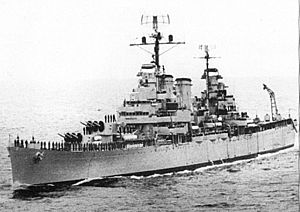
In Argentina, a military government was in power and facing economic problems. On 2 April 1982, Argentina invaded the Falkland Islands. This was the first invasion of British territory since World War II. Thatcher quickly sent a naval force to take back the islands. The Falklands War ended with a swift British victory. This created a wave of national pride and greatly increased Thatcher's popularity. This "Falklands Factor" helped the Conservative Party win a huge victory in the June 1983 general election.
Hong Kong's Future
China wanted Hong Kong back when Britain's 99-year lease on most of the territory ended in 1997. Thatcher met with China's leader, Deng Xiaoping, in 1982. They agreed on the Sino-British Joint Declaration. This plan allowed Hong Kong to return to China peacefully in 1997. Hong Kong would then keep its capitalist system for another 50 years.
Thatcher's strong stance against communism and the victory in the Falklands War boosted Britain's standing in the world. The economy also showed signs of recovery, helped by oil revenues from the North Sea.
Trade Union Power
Thatcher wanted to reduce the power of trade unions. She did this step by step. The most important strike was by the National Union of Mineworkers (NUM). However, Thatcher had prepared for this strike by building up coal stocks, so there were no power cuts. The Miners' Strike lasted a full year, from March 1984 to March 1985. The NUM eventually gave in without a deal. Thatcher's victory was a major turning point. Unions lost much of their political power, and a new economic approach began in the UK.
Thatcher's Ideas
Thatcher's ideas focused on free markets and encouraging new businesses. After 1983, her government became bolder and sold off many large public-owned companies. This policy of privatisation became a key part of "Thatcherism".
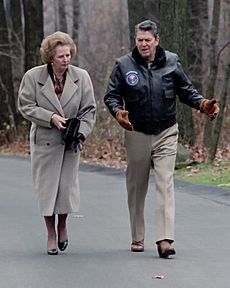
During the Cold War, Thatcher supported US President Ronald Reagan's efforts to reduce Soviet power. She allowed the US military to place nuclear missiles at British bases, which led to large protests. However, she was also the first Western leader to welcome the new Soviet leader, Mikhail Gorbachev, in 1985. She said, "We can do business together." This helped start a new period of cooperation with the Soviet Union.
Thatcher won the 1987 general election with another large majority. This made her the longest-serving Prime Minister since the 1820s. Many newspapers supported her.
However, many opponents believed her policies created a big divide between the richer south of England and the struggling industrial north. Welfare reforms in her third term also caused controversy.
By the end of 1989, unemployment was falling, but economic growth was slowing. Fears of another recession grew. In 1988, Thatcher became interested in environmental issues, bringing topics like global warming and ozone depletion to the national discussion.
In 1988, Thatcher spoke out against plans for a more unified Europe. She believed the European Community should focus only on free trade. She feared that new European rules would undo the changes she had made in the UK. This speech showed deep divisions within her own Conservative Party over Europe.
Thatcher's popularity dropped again in 1989 as the economy suffered from high interest rates. Her finance minister, Nigel Lawson, resigned after disagreements with Thatcher.
In November 1989, Thatcher faced a challenge for the leadership of the Conservative Party. She won easily, but a surprising number of votes went against her.
Her new local government tax, the "Community Charge" (or poll tax), was introduced in Scotland in 1989 and in England and Wales in 1990. This tax charged the same amount to every adult, regardless of income. This was her most unpopular policy. A large protest in London in March 1990 turned into a riot. Millions of people refused to pay the tax. Thatcher refused to change the tax, and its unpopularity was a major reason for her downfall.
By autumn 1990, opposition to the poll tax, concerns about the economy, and divisions over Europe made Thatcher's position weak. Her increasingly difficult personality also led many in her own party to oppose her.
John Major (1990–1997)
In November 1990, Michael Heseltine challenged Margaret Thatcher for the leadership. Thatcher did not get enough support and stepped down on 22 November, ending her 11-year time as Prime Minister. Her finance minister, John Major, won the leadership contest and became Prime Minister on 28 November 1990.
By this time, Britain was in another economic slowdown. Unemployment had started to rise.
John Major was Prime Minister during Britain's involvement in the Gulf War. Public support for the Conservatives improved, even as the economic slowdown continued into 1991 and 1992. Major called a general election for April 1992. He campaigned directly with the public, giving speeches from a soapbox. This popular approach helped Major win, though with a small majority in Parliament.
The Conservative government's small majority was difficult to manage. Especially after Britain was forced to leave the European Exchange Rate Mechanism on "Black Wednesday" (16 September 1992). After this, Labour, led by John Smith, became more popular in opinion polls. Major's handling of these events was seen as a weakness.
Major launched a "Back to Basics" campaign in 1993. He meant it to be about the economy and public services, but many saw it as an attempt to promote traditional moral values. This led to several embarrassing stories about Conservative politicians in newspapers, further hurting the party's popularity. The Conservative Party also suffered from internal disagreements.
Major's policy towards the European Union caused problems as the government tried to approve the Maastricht Treaty. Several Conservative Members of Parliament (MPs) voted against the government, causing difficulties.
The economy finally began to recover in April 1993 after nearly three years of slowdown. Unemployment started to fall. The economic recovery continued strongly through 1994, 1995, and 1996. However, Labour remained popular, especially after Tony Blair became leader in 1994 and rebranded the party as New Labour.
Few were surprised when Major lost the 1997 general election to Tony Blair. However, the huge scale of the defeat was unexpected. Labour won 418 seats, the Conservatives 165, and the Liberal Democrats 46. Labour had a majority of 179, their biggest since 1931. The Conservatives lost all their seats in Scotland and Wales. Major remained as opposition leader until William Hague was chosen to lead the Conservative Party.
Labour Government (1997–2010)
Tony Blair (1997–2007)
Tony Blair became Prime Minister in 1997 after a huge election win. His government, called New Labour, promised economic and social changes and moved the party closer to the political middle. Early policies included a minimum wage and university tuition fees. Finance Minister Gordon Brown gave the Bank of England the power to set interest rates independently. Blair's time as Prime Minister saw the longest period of economic growth in Britain since the 1800s. There was also large investment in health and education. The Human Rights Act was introduced in 1998, and the Freedom of Information Act in 2000. Most hereditary peers were removed from the House of Lords in 1999. The Civil Partnership Act of 2005 allowed same-sex couples to register their partnership with similar rights to marriage.
Labour's economic record was strong, and unemployment remained low for the next 10 years.
The long-running Northern Ireland peace process ended in 1998 with the Belfast Agreement. This agreement created a devolved Northern Ireland Assembly and reduced violence. It was signed by the British and Irish governments and approved by voters in Northern Ireland. In August 1998, a car bomb exploded in Omagh, killing many people. This attack was by a group that opposed the peace agreement.
In foreign policy, after the attacks on 11 September 2001 in the United States, Blair strongly supported US President George W. Bush's "War on terror". This began with removing the Taliban regime in Afghanistan. Blair also supported the Iraq War, based on claims that Iraq had weapons of mass destruction. A controversial report about Iraq's alleged weapons was later found to have copied parts of its text.
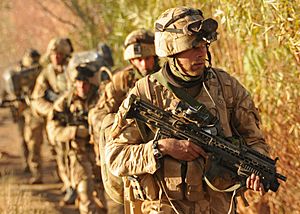
British troops were sent to help with the invasion of Iraq. After the war, no weapons of mass destruction were found. This led to much debate and criticism of Blair's decision.
The Labour government won elections again in 2001 and 2005. Blair became the first Labour leader to win three elections in a row, though his majority was smaller in 2005.
The Conservative Party struggled to challenge Labour. They changed leaders several times. However, after David Cameron became Conservative leader in December 2005, the party started to become more popular. Labour's support declined, partly due to concerns about immigration and fears of terrorism.
Devolution
Blair also introduced a policy of devolution. In 1997, a public vote in Scotland led to the creation of a Scottish Parliament. A similar vote in Wales led to a devolved Assembly for Wales. Both began operating in 1999. Devolution also returned to Northern Ireland. This left England as the only part of the UK without its own devolved government. However, London did get a new devolved authority.
Gordon Brown (2007–2010)
Tony Blair resigned on 27 June 2007, and Gordon Brown became Prime Minister that same afternoon. Brown took office without a general election or a leadership contest within the Labour Party.
Brown's way of governing was different from Blair's. He kept close ties with the United States and continued the Iraq war, but he also started an inquiry into why Britain joined the conflict. Brown focused on getting people off welfare and into jobs.
Brown's start as Prime Minister led to a brief rise in Labour support. There was talk of an early general election, but Brown decided against it.
Brown's government introduced policies to help the British economy during the financial crisis of the late 2000s. However, Britain's national debt increased greatly. Unemployment rose as the recession took hold, and Labour's popularity fell.
Several major banks were taken over by the government after facing financial problems. Large amounts of money were put into the economy to encourage spending.
Further European integration happened under Labour after 1997, with new treaties like the Treaty of Lisbon (2007). This treaty brought many changes, including more power for the European Parliament.
Brown's popularity fell significantly by late 2007. This was partly due to his decision not to call an early election and his handling of a tax rate change. His popularity hit a low point after a scandal involving MP expenses and poor results in local and European elections in 2009.
In January 2010, it was announced that Britain's economy had started to grow again after a long recession.
The 2010 general election resulted in a "hung parliament". No single party won enough seats to form a government on its own. The Conservatives had 306 seats, Labour 258, and the Liberal Democrats 57. Brown remained as a temporary Prime Minister while the Liberal Democrats talked with both Labour and the Conservatives about forming a government. He announced his intention to resign on 10 May 2010. On 11 May, Brown officially resigned as Prime Minister and Labour leader. This allowed the Conservatives to return to power after 13 years.
Conservative–Liberal Democrat Coalition Government (2010–2015)
The Conservative Party won the most seats in the 2010 general election but not an overall majority. David Cameron, the Conservative leader, became Prime Minister on 11 May 2010. This happened after the Conservatives formed a coalition with the Liberal Democrats. Nick Clegg, the Liberal Democrat leader, became Deputy Prime Minister. Other Liberal Democrats also joined the government.
Cameron promised to reduce Britain's growing national debt by cutting public spending. He also wanted to give more power to local authorities. He committed British troops to stay in Afghanistan until 2015. In June 2010, Finance Minister George Osborne announced an emergency budget. This budget raised VAT to 20% and included large cuts in public spending.
A key Liberal Democrat policy was voting reform. A referendum was held in May 2011 on whether Britain should use a system called "Alternative Vote" for elections. However, voters overwhelmingly rejected this idea, choosing to keep the current "first-past-the-post" system. The Liberal Democrats' change on university tuition fees disappointed their younger supporters.
In March 2011, the UK, along with France and the USA, voted for military action in Libya. In August, the death of Mark Duggan led to the 2011 England riots.
In 2012, the Summer Olympics were held in London for the first time since 1948.
In 2014, Scotland held a referendum on becoming an independent country. The "No" side, supported by the three main UK parties, won with 55% of the vote. Scotland chose to remain part of the United Kingdom. After the result, Scotland's First Minister, Alex Salmond, announced he would step down.
Conservative Government (2015–present)
David Cameron (2015–2016)
After years of economic austerity, the British economy was improving in 2015. The 2015 general election was held on 7 May 2015. The Conservatives took credit for the economic improvement. They promised to keep taxes low and reduce the national debt. They also promised a public vote on Britain's membership in the European Union. The Labour Party called for a higher minimum wage and higher taxes on the wealthy. In Scotland, the Scottish National Party (SNP) opposed austerity and demanded more power for Scotland.
Opinion polls before the election predicted a close race and another hung parliament. However, the surprising result was that a majority Conservative government was elected. The Conservatives won 331 out of 650 seats. The Scottish National Party also had a big win, taking 56 of the 59 seats in Scotland. Labour suffered its worst defeat since 1987. The Liberal Democrats lost most of their seats. The UK Independence Party (UKIP), which campaigned against Europe and immigration, gained a lot of votes but only won one seat.
After the election, the leaders of the Labour Party and Liberal Democrats resigned.
2016 European Union Membership Referendum
On 23 June 2016, UK voters chose to leave the European Union. 52% voted to leave, and 48% voted to remain. London, Scotland, and Northern Ireland mostly voted to remain. Wales and northern England mostly voted to leave. Although he called for the referendum, Prime Minister David Cameron had strongly campaigned for Britain to stay in the EU. He faced strong opposition from other parties who believed that being in the EU was bad for Britain's security and economy. UKIP leader Nigel Farage called the vote Britain's "independence day".
The vote to leave the EU, known as Brexit, had some immediate effects. Hours after the results, David Cameron announced he would resign as Prime Minister. Also, because Scottish voters largely wanted to stay in the EU, Scottish First Minister Nicola Sturgeon announced that the Scottish government would start planning another vote on Scottish independence. Economically, the value of the British pound dropped sharply after the results. Stock markets in Britain and New York also fell.
Theresa May (2016–2019)
A Conservative Party leadership election was held after Cameron resigned. Theresa May became the new leader and Prime Minister on 13 July 2016. On 18 April 2017, Prime Minister May called for an election on 8 June 2017, even though she had said she wouldn't. The election resulted in another hung parliament. The Conservatives were the largest party but were 9 seats short of a majority. This led to a Conservative minority government supported by the Northern Irish Democratic Unionist Party. After her proposed Brexit withdrawal agreement was rejected multiple times by Parliament, May announced her resignation.
Boris Johnson (2019–2022)
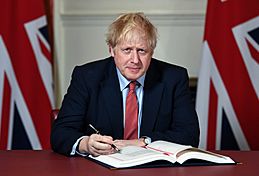
The time when Boris Johnson was Prime Minister began on 24 July 2019.
In September 2019, Johnson threatened to call a general election after opposition MPs voted against the government. This was to prevent a "no-deal" exit from the EU. A new election was approved for December 2019. The Conservative Party won a large majority. On 31 January 2020, Johnson led the country out of the European Union with a new Brexit deal. He also managed the impact of Brexit on the Irish border, by negotiating the Northern Ireland Protocol.
Johnson then oversaw the government's response to the COVID-19 pandemic. The government put in place national lockdowns, health programs, and vaccination rollouts. The economic effects of the pandemic and Brexit led to a cost-of-living crisis starting in 2021, with prices for many goods and services increasing sharply. The Russian invasion of Ukraine in February 2022 led Johnson to support Ukraine financially and militarily. Johnson's government faced various controversies in 2022. He resigned in September 2022 but served as a temporary Prime Minister until a new leader was chosen.
Liz Truss (September – October 2022)
The time when Liz Truss was Prime Minister began on 6 September 2022. Queen Elizabeth II's invitation for Truss to form a government was one of her last actions before her death two days later. This meant Charles III became King, and the Queen's funeral dominated Truss's first weeks in office.
Truss and her finance minister, Kwasi Kwarteng, announced a "mini-budget" on 23 September 2022. It proposed cutting various taxes during the ongoing cost-of-living crisis. This budget received strong criticism. The value of the pound and Truss's popularity fell to very low levels. Kwarteng resigned, and Jeremy Hunt took over as finance minister. Hunt quickly reversed all the proposals of the mini-budget. However, this did not ease the political pressure on Truss. She announced her resignation on 20 October 2022, making her the shortest-serving Prime Minister ever. A new leadership election was called to replace Truss within a week.
Rishi Sunak (2022–present)
The time when Rishi Sunak was Prime Minister began on 25 October 2022. Sunak is the first Prime Minister appointed during the reign of King Charles III. He is also the first British Asian, first British Indian, first person of colour, and first Hindu Prime Minister. He is also Britain’s wealthiest ever Prime Minister, having been a hedge fund manager. Sunak attended the coronation of Charles III and Queen Camilla on 6 May 2023.
Sunak continues to manage the British government's response to the cost-of-living crisis, a rise in worker strikes, and the ongoing effects of Brexit.
Images for kids
-
Former prime ministers Gordon Brown (2007–2010), Tony Blair (1997–2007), John Major (1990–1997), Deputy Prime Minister Nick Clegg and then-Prime Minister David Cameron pictured together in 2011
-
The British sank the Argentine cruiser ARA General Belgrano during the Falklands War.
-
Thatcher with President Ronald Reagan, 1986.
-
British troops in the Afghan War.
-
Johnson signing the Brexit Withdrawal Agreement, 24 January 2020
See also
- 2010s in United Kingdom political history
- 2020s in United Kingdom political history
- Political history of the United Kingdom (1979–present) § Notes
- Post–World War II economic expansion
 | Delilah Pierce |
 | Gordon Parks |
 | Augusta Savage |
 | Charles Ethan Porter |


